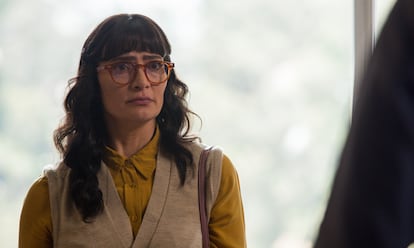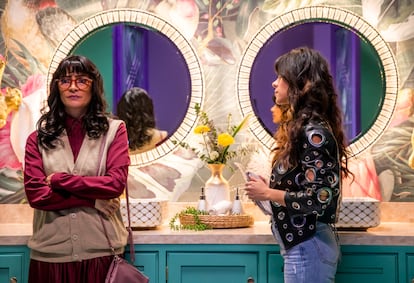Mauricio Cruz, director of ‘Ugly Betty’ sequel: ‘Even the most beautiful woman in the world identifies with her’
The director of the Colombian soap opera, which will premiere on Amazon Prime on July 19, faced the challenge of explaining what happened to Beatriz Pinzón and the other characters 25 years later, with an updated take


Betty goes against the first commandment of the Latin American soap opera, which dictates that the protagonist must be a woman of indisputable beauty. A beauty such that it will guarantee that she —a young, happy and carefree thing brought up in a rural area or low-income neighborhood— will manage to find a beau who lifts her from poverty and takes her to live in his mansion or castle. Fernando Gaitán, creator of this iconic character, was familiar with the mechanisms of melodrama, but at the end of the 1990s he decided to challenge them. “What if you made a woman of flesh and blood?” he explained in an interview. A main character onto whom the public does not project their own desires, but rather witnesses a woman who dreams behind her glasses, braces and bangs.
A couple of months before the turn of the millennium, on October 25, 1999, Colombia presented one of its most universal characters: Beatriz Pinzón Solano, a financial genius who falls in love with her boss in silence, with her diary as the only witness. Its national success — seven million people simultaneously watched the first kiss with Don Armando — was followed by an unprecedented global reach. The story has been broadcast in more than 180 countries, dubbed into 25 languages and adapted 24 times, which is why it was included in the Guinness Book of World Records as the most successful soap opera in the history of television. There is a Chinese Betty, a Turkish Betty, a Serbian Betty and a Vietnamese Betty.
“Everyone identifies with her,” says Mauricio Cruz Fortunato, to try to explain the success of Betty, whose sequel he has directed and which will premiere on July 19 on Amazon Prime.
Question. This project is a sequel to Ugly Betty, that is, nothing was written beforehand. Isn’t it much riskier than making a different version, as in the case of Café con aroma de mujer?
Answer. Yes, let’s say they are different risks. Café is also something very strong in Colombia and in the world, but when I found out about this project involving Ugly Betty, I thought that a remake was impossible. There is no one to replace Betty. I thought it was doomed to be a failure, until they told me: ‘No, it’s 20 years later.’ I found it incredible, because it is seeing how life has progressed, how their lives have advanced.
Q. What was your feeling reading the script?
A. It’s very difficult because Betty is an icon, a very endearing character. The whole world has seen Betty, and not just our Betty, but I don’t know how many versions of her. When I saw it again, not as a member of the audience but as a director, I was amazed by the old Betty, and now I am amazed by the new one. It was very difficult to update the story. There are many things that happen in the original Ugly Betty that I think are unthinkable now: the machismo, everything focused on beauty, a little banal. Now there is more depth, with a Betty who is a mature woman, with her abilities and failures, like any human being, which I think is the essential and most wonderful thing that [screenwriter] Fernando Gaitán invented. It was creating a character from different points of view, and making sure we all identified with it.
Q. Having made Café before and now the sequel to Betty, don’t you sometimes have the feeling that you know Fernando Gaitán [who died in 2019]?
A. I had the good fortune of meeting him, at various times, for work and also on a social level. He was a brilliant guy; to me, a genius. The thing is, I believe that if you manage to invent a character like this in your lifetime, you have already achieved everything. I think of Chaplin, I think of Sylvester Stallone with Rambo and with Rocky. I hope I don’t sound pretentious, but I see it at that level. I think Gaitán had a very interesting feminine side, because he understood love very well. Yes, he had such a deep and beautiful sensitivity, and he managed to capture it on paper, and we are fortunate enough to be able to bring it to the screen.
Q. As you said, the previous Betty had elements that are unthinkable today. Now there is a much more inclusive outlook, but can’t we sometimes fall into forced inclusion?
A. I believe that there is a moral obligation. It is about participation and about educating. When you’re doing a project like this, which is so accepted globally, there is more responsibility. To live up to this, it had to be inclusive. Sometimes there are things that seem forced, but I do believe that we come from a country of such great variety, such a strong mix at a racial and cultural level, that we must exploit those values. And it is important to me that it should be so. In Betty, in what we did, I don’t see it as forced. Plus, it always had a gay character. Now, there is a twist that seems incredible, which is that the people we considered nerds at the time are now the important people. It maintains something, because beauty is still important in our lives, there’s nothing we can do about that, but it is no longer the basis for everything else. Now it’s about the discovery of the empowered, strong woman, with problems as a mother, with her partner, with frustrations, with failures, with triumphs.

Q. When Betty’s transformation occurred, when the soap opera was broadcast in Colombia, in 2000, there was great expectation. We were used to Mexican soaps in which the protagonist returned, beautiful and ready to take revenge. The public at that time was missing something, because Betty kept her glasses and braces...
A. In the 2000s everything was aspirational, even for men. Beauty was part of the triumph. I think that’s the transformation we’ve had. And I think we’re lucky in that. I’m not saying beauty isn’t important. Of course, beautiful people are lucky in that sense, but there is one thing that is a much stronger aspiration, which is towards inner beauty. And this second part of Betty is about that. More than that, it is about seeing how she returns to her essence: I transformed myself so that society would accept me, but who am I, how do I like myself? And see Armando also loves his Betty like that, because that’s how he fell in love with her.
Q. In the case of Betty, in addition to being the story of an ugly woman, it is also the story of a woman who remains in the shadows, in that hidden office. The woman who works behind the scenes while the one who gets all the credit is the man...
A. That’s the previous story. I believe that when we all start, we are in the shadow of someone else and work for others. As a teacher told me many years ago, the important thing about talent is maintaining discipline so that the talent emerges, like a drop of oxygen in the middle of the sea: one day it will float out. And it’s true. The story is about a woman in the shadows, trying to make her boss shine, and she succeeds, but in the sequel we already see a real, mature woman who has succeeded.
Q. It is also, then, a story about the maturity of women
A. I think we are a link, those of us of a certain age, who lived in that era and now see the new masculinity, the empowerment of women. Sometimes I think that I am lucky to be a link between some generations and others, to realize that change. I hope that my son is a man quite different from what I was, and from what his grandfather is. Betty is also a link. What I like most about this character is that she seems super sensitive to me. A woman who is a mother of a twenty-something, with a difficult marital life, because they work together, and I think there is nothing more difficult than working with your partner, in the husband’s company, where she is the president and has to give orders. And thinking about forgiveness, because Armando did many terrible things in the past, and as we all know, the wounds heal, but the scars remain.
Q. Colombian television had already become somewhat international, but Betty marked a before and after. Why do you think it became a global phenomenon?
A. For me Betty has a mixture of two stories from literature: The Ugly Duckling and The Count of Monte Cristo. It is a fight for self-improvement, because she is a very educated middle-class girl, a genius who does not fit the beauty stereotypes of that time. If we see it today, it is very funny because she would be considered a ‘hipster.’ But at that time neither the word nor the concept existed. I don’t know anyone who doesn’t identify with the loser. A loser with an incredible heart, like her. She is a very intelligent woman but she has an emasculating father. Don Hermes is a divine character, but he is a conservative, terrible gentleman who likes to take care of his princess. So Betty has to get out of that to be able to make her own life. One of the first things she has to get rid of is her dad’s influence. Everyone identifies with that. The most beautiful woman that could exist in the world sees Betty and identifies with her, because she has experienced situations in which we all feel reflected. We have all felt ugly at some point in our lives. We have all had frustrations or failures. Life itself has taken it upon itself to bring us down in some way. There is not a person in the world who has not been defeated. I think that’s what it is: it allowed people to identify, not only women, but also men. It also shows us how we men should not behave. For me, it is inclusive in every way. Not only by today’s standards, but always. Acceptance would be the strongest word this project is associated with.
Q. When you watch Betty, what do you like the most?
A. Physical clumsiness embarrasses me greatly. I see her and I think she is beautiful. When something happens to her due to her clumsiness, like falling in a circumstantial way, it makes me feel embarrassed. Poor thing, how is this happening to her? And when it happens in the new season, those were the scenes that caused me the most anguish, yet at the same time they entertained me, because there is nothing that entertains people more than witnessing the tragedy of others. For me, there is nothing more comical than drama. Being able to laugh at other people’s drama.
Sign up for our weekly newsletter to get more English-language news coverage from EL PAÍS USA Edition
Tu suscripción se está usando en otro dispositivo
¿Quieres añadir otro usuario a tu suscripción?
Si continúas leyendo en este dispositivo, no se podrá leer en el otro.
FlechaTu suscripción se está usando en otro dispositivo y solo puedes acceder a EL PAÍS desde un dispositivo a la vez.
Si quieres compartir tu cuenta, cambia tu suscripción a la modalidad Premium, así podrás añadir otro usuario. Cada uno accederá con su propia cuenta de email, lo que os permitirá personalizar vuestra experiencia en EL PAÍS.
¿Tienes una suscripción de empresa? Accede aquí para contratar más cuentas.
En el caso de no saber quién está usando tu cuenta, te recomendamos cambiar tu contraseña aquí.
Si decides continuar compartiendo tu cuenta, este mensaje se mostrará en tu dispositivo y en el de la otra persona que está usando tu cuenta de forma indefinida, afectando a tu experiencia de lectura. Puedes consultar aquí los términos y condiciones de la suscripción digital.








































